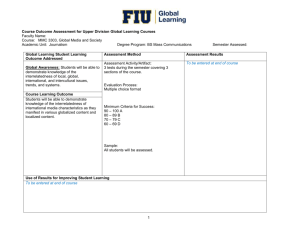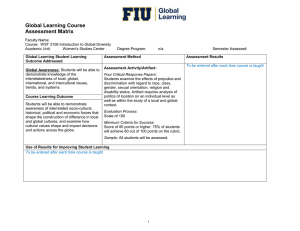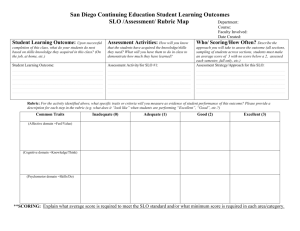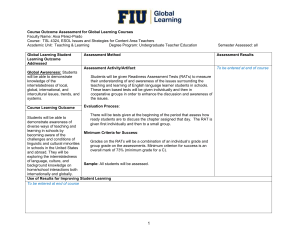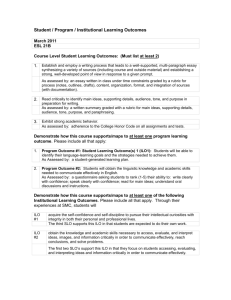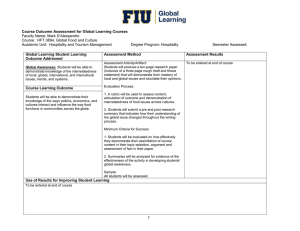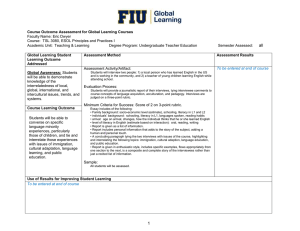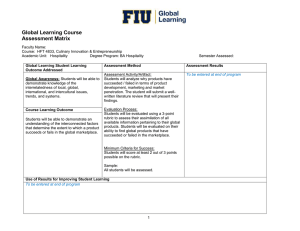Expanded Statement of Institutional Purpose
advertisement
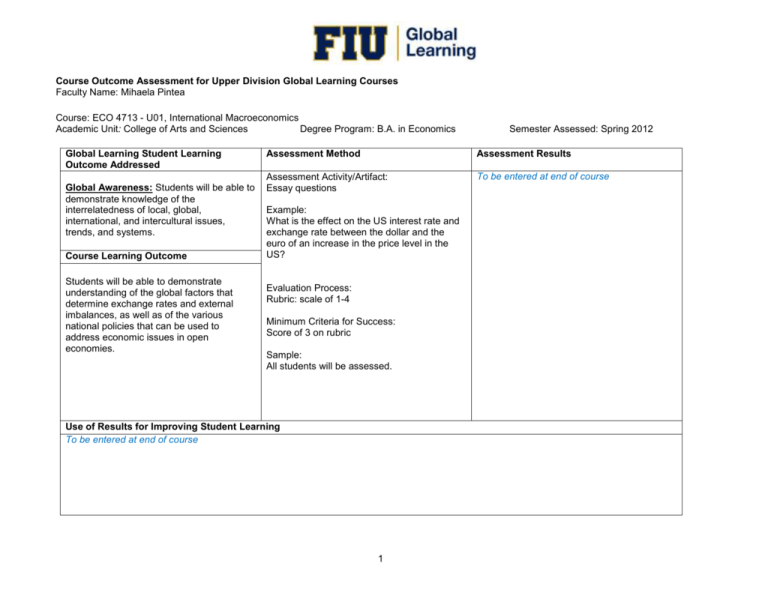
Course Outcome Assessment for Upper Division Global Learning Courses Faculty Name: Mihaela Pintea Course: ECO 4713 - U01, International Macroeconomics Academic Unit: College of Arts and Sciences Degree Program: B.A. in Economics Global Learning Student Learning Outcome Addressed Global Awareness: Students will be able to demonstrate knowledge of the interrelatedness of local, global, international, and intercultural issues, trends, and systems. Course Learning Outcome Students will be able to demonstrate understanding of the global factors that determine exchange rates and external imbalances, as well as of the various national policies that can be used to address economic issues in open economies. Semester Assessed: Spring 2012 Assessment Method Assessment Results Assessment Activity/Artifact: Essay questions To be entered at end of course Example: What is the effect on the US interest rate and exchange rate between the dollar and the euro of an increase in the price level in the US? Evaluation Process: Rubric: scale of 1-4 Minimum Criteria for Success: Score of 3 on rubric Sample: All students will be assessed. Use of Results for Improving Student Learning To be entered at end of course 1 Course Outcome Assessment for Upper Division Global Learning Courses Faculty Name: Mihaela Pintea Course: ECO 4713 - U01, International Macroeconomics Academic Unit: College of Arts and Sciences Degree Program: B.A. in Economics Global Learning Student Learning Assessment Method Outcome Addressed Assessment Activity/Artifact: Essay questions Global Perspective: Students will be able to conduct a multi-perspective analysis of local, global, international, and intercultural Example: problems. How might “liability dollarization” worsen the financial market disruption caused by a sharp Course Learning Outcome depreciation of the currency in emerging Students will be able to conduct analyses of economies? economies in a global setting by identifying different factors (e.g. technological, demand and supply shocks, fiscal and monetary policies, exchange rates arrangements) that lead to economic crises and opportunities. Evaluation Process: Rubric: scale of 1-4 Minimum Criteria for Success: Score of 3 on rubric Sample: All students will be assessed. Use of Results for Improving Student Learning To be entered at end of course 2 Semester Assessed: Spring 2012 Assessment Results To be entered at end of course Course Outcome Assessment for Upper Division Global Learning Courses Faculty Name: Mihaela Pintea Course: ECO 4713 - U01, International Macroeconomics Academic Unit: College of Arts and Sciences Degree Program: B.A. in Economics Global Learning Student Learning Assessment Method Outcome Addressed Assessment Activity/Artifact: Global Engagement: Students will be able Essay questions to demonstrate willingness to engage in local, global, international, and intercultural problem solving. Example: After the debt crises of the 1980s many developing countries wanted to improve their Course Learning Outcome current account. What kind of policies would you have recommended to reach this goal? Students will be willing to work individually and in teams to develop solutions to various economic issues in a global setting. Evaluation Process: Rubric: scale of 1-4 Minimum Criteria for Success: Score of 3 on rubric Sample: All students will be assessed. Use of Results for Improving Student Learning To be entered at end of course 3 Semester Assessed: Spring 2012 Assessment Results To be entered at end of course
